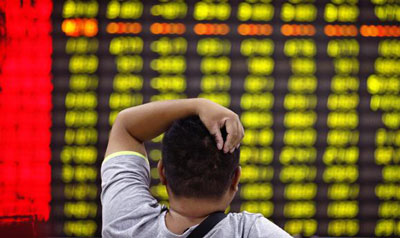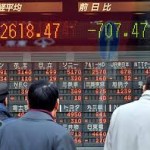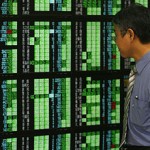China Shares Fall; Japan Rises Ahead of U.S. Jobs Data

Bank, energy firms pressure Australian shares
China’s shares fell and bank shares pressured Australia on Thursday, but Japan’s market rose ahead of a key jobs report in the U.S. later this week.
The Shanghai Composite Index was last down 0.3% at 3682.31 and the smaller Shenzhen Composite fell 0.3% at 2122.20, as investors continue to assess the level of regulators’ commitment to support mainland stocks.
On Thursday, fresh worries emerged that China’s stock regulator might start approving firms’ share-placement applications as early as this Friday. The prospect of new shares could prompt investors to withdraw cash from existing positions.
“The fact that the regulator didn’t deny [local media reports of the timeline] last night confirmed investor concern, thus dragging down the market,” said Zhang Gang, an analyst at Central China Securities.
Still, the backdrop that Beijing will continue to buy shares to prop up the market remains. Goldman Sachs analysts estimate that the Chinese government has spent up to 900 billion yuan ($144.9 billion) to support the stock market, equivalent to 1.6% of the market’s total capitalization and 2.2% of its free float size, or the amount of freely tradable shares.
“We believe authorities including the [central bank] are also likely to inject further liquidity if needed,” the firm wrote in a research note. “It is too early for them to reverse course, especially given the still-skittish manner in which the market is trading.”
The firm says it believes the government, through a state-owned fund called China Securities Finance Corp., which has been tasked to prop up the market, has the potential to spend roughly two trillion yuan to buy stocks directly and indirectly through investing in mutual funds and providing credit to brokers, based on local media reports.
ANZ analysts estimate that Chinese banks, which have also been tasked to support the market, have extended 1.3 trillion yuan to CSF Corp.
In Australia, the S&P ASX 200 was down 1.3% as the country’s biggest banks take steps to raise billions of dollars to meet regulatory demands for higher capital holdings, a protection against the risk of possible crises.
Australia & New Zealand Banking Group Ltd. announced Thursday plans to raise 3 billion Australian dollars (US$2.2 billion) as it reported a strong rise in quarterly profit. A day earlier, Westpac Banking Corp. increased the size of a hybrid-securities offering by A$500 million to A$1.25 billion.
Shares of Australia & New Zealand were suspended. Westpac was down 3.5%.
A fall in oil also is hurting Australian energy firms after light, sweet crude prices fell to multi-month lows overnight. Weekly inventory data showed a small increase in U.S. crude production and President Barack Obama urged lawmakers to support the Iranian nuclear deal.
Brent was up last 0.2% at $49.71 in Asia trade, although it slid to as low as $49.65 overnight.
Shares of Rio Tinto Ltd. rose 0.4% ahead of the firm’s first half earnings after the Australian market closes today. Underlying profit is forecast at US$2.42 billion, based on the median of seven analysts’ forecasts compiled by The Wall Street Journal. That’s roughly half a year-earlier profit of US$5.12 billion amid a deepening commodities slowdown.
Elsewhere, the Nikkei Stock Average was up 0.7%, helped by a weaker yen.
Investors await U.S. jobs data on Friday, which could color expectations that the Federal Reserve will raise interest rates next month.
The U.S. dollar traded at ¥124.76 from ¥124.88 at the close yesterday. Although stronger today, the yen has been weakening ahead of U.S. nonfarm payrolls data Friday. It is down 0.7% week to date.
“Yen selling and futures buying is likely to continue for the short-term until this week’s U.S. jobs data is completely digested,” said Norihiro Fujito, senior investment strategist at Mitsubishi UFJ Morgan Stanley Securities.
The U.S. dollar remains stronger against a number of Asian currencies. It rose to as high as 3.8935 Malaysian ringgit for the currency to mark a new 17-year low. The dollar was at 3.8761 at Wednesday’s close Asia.
South Korea’s Kospi was down 0.8%.
Source: WSJ – China Shares Fall; Japan Rises Ahead of U.S. Jobs Data




























